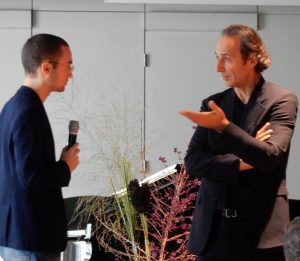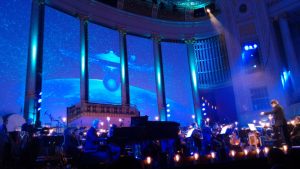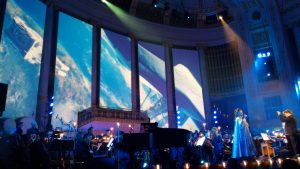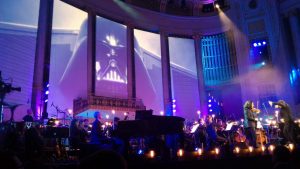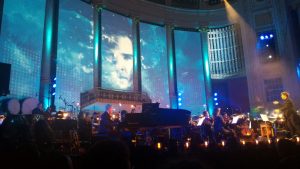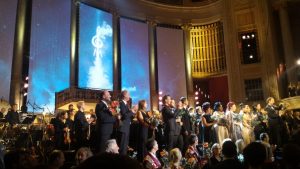Hollywood in Vienna 2016 – Summary and INTERVIEW with Alexandre Desplat
Hollywood in Vienna is an event that is growing with each edition, and that has been complementing the great gala concert (main act of the event), with a masterclass, conferences and a symposium. So, unlike other years, this time I decided I had to go to Vienna with time, to experience firsthand the academic activities that were to be held there for two days.
This extensive article describes what I could live in those two days in Vienna, and is complemented at the end with a couple of brief interviews, conducted in-situ to composer and main guest Alexandre Desplat and Sandra Tomek (festival director).
DAY 1 - THURSDAY 10/13/16 - FIMU MASTERCLASS
Thursday noon at the University of Music and Performing Arts of Vienna, a masterclass was held with Alexandre Desplat as the central figure. The masterclass had limited seats, with a maximum of 20 participants and a registration fee of 150-200€. However, it was possible to attend as public for free and see what was being commented throughout the session, which resulted in listening to very interesting ideas and debates.
The dynamics of the masterclass was the following: there were 20 music/composition students (or beginner composers in some cases) gathered in the room, and each person had audio / video files on a flash drive, so one by one they went on stage, greeted Alexandre Desplat, and after introducing themselves and explaining their works, they were played on screen using the equipment of the hall.
Just at the beginning of the session, Alexandre Desplat said that he was not a member of a jury and that he was not there to judge the work of the people; without having the full script, or seeing where did each piece fit in the movie, or knowing what he director asked, he commented that the main focus of the masterclass should be to have a debate and exchange ideas. Good way to approach the workshop, very valid and very educational.
During the session very interesting things were said, for example, that the film is the director’s world, on which he has been working for a long time, and the composer is a guest who arrives late and has to try to find the tone to the film, that sometimes is only in the head of the director. He also said that he often prefers to wait until there’s a final version of the film to work on the soundtrack, even if it means to have less time for composing, and he also gave ideas about orchestration and instrumentation to participants, explaining parts of their pieces that he felt were not working properly or that could be improved for better storytelling.
If I had to mark a phrase that Alexandre Desplat said, it would be the following: “I have not studied composition professionally as you are doing here at the university, so it is not my intention to teach you composition. My intention is to open your minds, make you think and give you ideas, so you can find your own voice.”
In short, it was a 3h workshop (which extended to just over 3:30h including the break), and that turned out to be very interesting and productive for both composers and fans of soundtracks.
As a weak point, I thought that the grand piano that was on stage was going to be used at some moment, giving support and providing additional information for some of the pieces shown, or even some of the students might have played some of their pieces live instead of using the multimedia equipment, but it didn’t happen. Perhaps Alexandre Desplat himself might have helped a bit by pulling them to the piano with his explanations (he made a couple of approaches, but they didn’t go on).
Technically speaking, the equipment of the room was impeccable, managing multiple sources of audio / video from a control desk, resulting in a continuous flow of works shown, which on more than one occasion I thought could fail due to the variety of samples and changes that had to manage, but didn’t!
There was just one inconvenience about the hall, and it is that the big windows didn’t have any kind of blinds or curtains to darken the room, so the hall was completely illuminated all the time, and the videos were not looking good on screen (specially the dark ones).
After the workshop, the evening held a visit to Synchron Stage Vienna for the students, which is a new recording studio set up in Vienna just over a year, but that is established on the basis of a recording studio that was there with a lot of history and dated back to the 40s-50s. Unfortunately I could not go to the visit the studio, from which I have heard so many good things, both technically and acoustically, but there it is, on my to do list for the next trip I take to Vienna.
And to end the day, the concert Hollywood in Vienna was held at night, which had the same program of the gala concert of the next day, Friday, but without the ceremony of the Max Steiner Award for Alexandre Desplat, coming in detail in the next section.
DAY 2 - FRIDAY 10/14/16 - FIMU SYMPOSIUM and GALA CONCERT
The day began early, around 9 am, with a series of public conferences (registration and payment of an entry of 15-20€ required), and that were centered on various aspects related to the world of soundtracks and composition such as: the recording of film music in Vienna, how is the work of an agent / producer of a Hollywood composer, and the icing on the cake, a panel with Alexandre Desplat followed with Q&A from the public, to finish with a signing session.
The symposium program was as follows:
Although I could not attend the entire symposium and I had to focus on the second part, I’d like to highlight the interesting talk of Laura Engel, after which many people approached her during the break, asking more about her experiences, and the session with Alexandre Desplat and Doreen Ringer Ross (moderator). In this session, movie clips where showed and Alexandre gave indications of how he had reached that particular musical solution, later giving way to an extensive round of questions and answers with the audience, which was the supplemented at the end with a signing session on the hall (which generated a long line, but everybody got a signature).
And now, with the symposium finished, the big central event of Hollywood in Vienna was coming, the gala concert to be held at 7:30pm at the Wiener Konzerthaus.
HOLLYWOOD IN VIENNA 2016 - GALA CONCERT
Almost an hour before the concert, at 6:30 pm, photographers and TV & radio reporters were already gathering at the door of the concert hall, on the red carpet, where all the famous people who would participated in the evening showed up (actors, singers, personalities, and musicians who completed the artistic part of the event).
I won’t get tired of saying that the concert hall of the Wiener Konzerthaus is a spectacular place, and if it was not because I’ve been inside several times, I would have been astonished to the decoration and the lights and colors of the main hall. These, visually potentiated the stage, on which there were placed 5 white fabrics, that would be of great importance during the evening, as images and videos specifically created for the occasion would be projected there, fully synchronized with music (you can see more details of the gala 2015 here: article)
The concert started 15 minutes later than expected, at 7:45 pm, with the presenter of the gala Stephen Gätjen introducing the Neue Wiener Stimmen Choir and the ORF Vienna Symphony Orchestra, under the baton of Keith Lockhart for the second year in a row.
The first part of the concert, entitled The Sound of Space, was a selection of 13 pieces coming from space films and productions, and that had been specially arranged and orchestrated for this concert, with many of them being world premieres that we were going to enjoy tonight.
As usual, the concert began with the Hollywood in Vienna Fanfare (Max Steiner, Bruce Broughton), setting the tone of the evening, and giving the feeling that we were starting the screening of a Hollywood blockbuster, a feeling that was not very misguided.
Following we had 2001: A Space Odysee – Also Sprach Zarathustra & Op 30: I Prelude (Richard Strauss), while on the screens above the orchestra, animated images showing the planet earth from space were projected, and then Spaceship Earth – Suite (Bruce Broughton) was played.
Finished this block, Steve Gätjen came on stage again to present the next part, and he did with a long introduction in German, which left everyone who did not speak that language quite confused, although later an equivalent presentation was made in English, but it was shorter in length and content.
This situation was repeated throughout the night, with the presenter appearing back on stage multiple times, almost every 2 or 3 themes, breaking the rhythm more than necessary, and not leaving the music flow as it would have been desirable. I think a new formula should be found for successive editions, both not to cut the flow of the show and to consider the public that comes from abroad and does not speak German.
But back to the concert, the next piece to be played: Star Trek: The Motion Picture – Main Title (Jerry Golsdmith) was very strong and had a very good execution, offering a tribute to 50 years of Star Trek celebrated this September 8th of 2016, marked by the broadcast of the first episode on TV.
With images that gave way to videos of the film, Contact – Main Title (Alan Silvestri) was played, to later follow a theme that began with a lot of energy pouring out of the orchestra, Star Gate – Suite (David Arnold), and that had a very good start when images of the Stargate and the Egyptian pyramids showed, but as the theme developed, it started failing in the brass section, that began to be too intrusive and overlap the melody. Anyway, the piece was very well played by the rest of the orchestra, and had a peak towards the end when the choir joined to give power to the music and make us jump through the Stargate.
Next Gravity – Main Title (Steven Price) started, a piece that at first seemed it could be transitional, but from the beginning, with the presence of the choir and the oppressive rhythm that was marked by the orchestra, very well controlled and focused by Keith Lockhart, could be anticipated that was going to be one of the surprises of the night.
When the tone of the piece was already set, singer Katherine Ellis (the original singer in the film) came into play, filling the room with her voice and with her accomplice gazes to the public. With stunning vocals and an orchestra to perfectly support her and complement her, at the end of the piece, and seconds before ending the music, the singer performed the last notes, giving way to the orchestra, which put a cathartic end as a visual explosion filled the screens. Awesome! A theme that drew a great applause from the public, and was well deserved.
While we still had goosebumps from Gravity, the soft and melodic first notes of Interstellar – Suite (Hans Zimmer) started, that were perfectly tempered by the ability in the piano of František Jánoška, usual pianist from previous years of Hollywood in Vienna, and master of that instrument, as he demonstrated repeatedly throughout the night. The suite gave an overview of the main themes of the film, introducing violin-hits to mark rhythms, and the omnipresent characteristic organ of the soundtrack, which was played by Martin Haselböck.
Following it was time for the violin wunderkind Iskandar Widjaja, who played a very special version of Star Wars: Episode II + III – Anakin and Padmé – Suite for Violin and Orchestra (John Williams). While the suite was very well prepared (great harp) and was very well played by the violin, the excessive breathing of the violinist, that could be heard louder than the music in occasions, and the violin solos that were too sharp and somewhat forced sometimes, took me out of the essence of this love theme for moments.
Then the music of Star Trek came back, but this time in a special version of Star Trek: First Contact – Main Title (Jerry Goldsmith), which featured the voice of soprano Kristin Lewis. In this world premiere, specially prepared for the occasion, the singer showed her mastery of the voice, playing at will with the complicated end of the piece. Another great applause of the night.
And to end this first part, the wonderful E.T. The Extra-Terrestrial – End Credits (John Williams) came, where again the piano mastery of František Jánoška dazzled us and made us levitate, like ET did with the bike in the film and on the screens of the room.
So when about an hour of concert had passed, the intermission happened with an explosion of light effects and colors in the hall, to begin the second part shortly after 9pm, which under the title The Wondrous World of Alexandre Desplat, would take us to the wonderful world of this modern musical wizard.
The first piece was Girl with a Pearl Earring – Theme, where the orchestra flowed throughout the performance, and Keith Lockhart showed that the rapport he had with them, had increased from last year.
Following we could enjoy a great Suite – Medley from multiple Alexandre Desplat movies, listening to: The Golden Compass, Twilight, The King’s Speech, The Curious Case of Benjamin Button and Rise of the Guardians. A very well-adjusted suite, perfectly linked, with an appropriate balance of pieces and duration, and that had notable moments as the lights in the hall with Twilight, or the virtual dancer that appeared projected on the center screen over the stage during Benjamin Button, and that closed with both the musical and the visual power of Rise of the Guardians. Wonderful orchestra and impressive visual spectacle offered on the screens, with images that evoked and reinforced perfectly what the music was transmitting.
The next two themes, Julie & Julia – Julia’s Theme and Coco Avant Chanel – Chez Chanel, were separated in the program but were interpreted in one piece, with Andrej Surta at the accordion in the first one, who entered through a side door the of hall to fill the place with his accordion, like a street musician who had sneaked into the function. Very good performance and staging.
Then The Imitation Game – Theme was played, where the agility of the piece with the dynamism provided by the orchestra, made this brief theme having a brilliant execution.
Following, without allowing us to rest, the first notes of The Ghost Writer – Suite started playing, giving a good review to the great music of this interesting film, where the visual part, which focused on providing video fragments of the film, was not very correct as it kept spoiling most of the key moments of the movie, including the ending.
The next piece was Godzilla – Theme, with a good performance, and good lighting effects that contributed strongly to the music, and with a graceful final visual show where the Konzerthaus suffered this gigantic monster.
Then we had one of the surprises of the night with Lust, Caution – Wong Chia Chi’s Theme, where František Jánoška’s fingers at the piano, were accomplices of two dancers who came out of the side doors of the hall, and offered a choreography while they walked through the main corridor.
After a long round of applauses, the group of musicians Metin Meto, Derya Türkan & Friends began to appear on stage; a total of 6 people with various ethnic instruments, which were to accompany the orchestra in Argo – Suite. Starting with oriental sounds that created the environment for the beginning of the film, the group gave way later to the orchestra with a western sound, which had its peak when the release occurs in the movie with the theme The Mission, perfectly integrated into the suite. A fabulous performance!
Next we had a surprise, a recorded video-message from Wes Anderson was projected on the central screen, where he thanked Alexandre Desplat for his talent and collaboration on projects they had shared together. And after this introductory video, the soundtrack that made him win his first (and only… for the moment) Oscar began, The Grand Budapest Hotel with the pieces S’rothe Zäuerli & Mr Mustapha.
From the balconies of the theater, the Yodelers Ruedi and Christian started the song, and soon were joined by Trio Grotesque (with a curious and giant Bass-Balalaika), male choir Don Cossacks Choir and Mandolin Quartett Allegro, all complemented by the strong and accurate interpretation of the orchestra under the watchful eye of Keith Lockhart. A great mix of sounds and textures, very well merged, which left no doubt of the awards received by this soundtrack.
And lining up the final part of the concert, it was time for Harry Potter and the Deathly Hallows – Suite, where the strength of the theme was growing as did the darkness of the music, but that had a percussion section that was too intrusive, something that unfortunately detracted prominence to the interpretation of the orchestra, although it got balanced when the chorus came on scene.
And the last song of the night was Rise of the Guardians – Still Dream, where singer Grace Capristo, made an appearance in the center aisle of the hall, wonderfully interpreting the lyrics as she approached the stage.
After an intense applause, it was time to give the Max Steiner Film Music Achievement Award to Alexandre Desplat, who went on stage to collect it, and told how Max Steiner was the one who accompanied him in the beginning when he wrote music with 21 years old, for a soundtrack where he was asked to imitate his style. As Desplat said, it is curious the twists of fate, which made him be right now in Vienna to receive an award with his Max Steiner’s name.
Without leaving the stage, Alexandre Desplat took over the orchestra to conduct a world premiere theme, The Secret Life of Pets – Meet the Pets, an overflowing and very rhythmic theme, full of color and jazzy joy, which made the audience wanting to move in their seats, and where you could see that both director and orchestra were enjoying playing. A fantastic and energetic end of the evening!
With Keith Lockhart again on stage, the orchestra played the wonderful music of Max Steiner’s Gone With The Wind, saying goodbye to this fabulous and unrepeatable night, while credits of the people who participated making this possible were showed on the screen.
And thus the gala ended as it started, with a film ending for a wonderful movie night.
IN SUMMARY
The Hollywood in Vienna gala concert has a production and a preparation that is impeccable. Every detail is taken care of, up to the last small part, and you can feel ther’re many hours of work of many people behind it, resulting in an exceptional resultl.
If I had to make a brief summary in just one line, I’d say there is no other concert like Hollywood in Vienna in Europe right now. Period. Plain and simple.
It is not only the musical aspect, which is incredibly prepared, performed and interpreted by the wonderful orchestra and chorus, but also the lighting design and visual design that surround the music, and that make the Wiener Konzerthaus become a fantasy place for one night, where magic and power of music can be felt in the ambience.
The fact that the concert is recorded for television and broadcasted both in radio and television days later, is an extra that allows people to live the experience again and again, and I just hope that as has been recently done with 2013 gala for James Horner, this year’s concert will also be edited on Blu-Ray (as well as the rest of the pending concerts).
While waiting for the surprises that the 2017 edition may bring us, to end this article, here I leave you with two brief interviews that I could do that night to the honoree Alexandre Desplat and festival director Sandra Tomek.
INTERVIEW - ALEXANDRE DESPLAT
Tonight you will receive the Max Steiner Award in Vienna, a city that has been an important reference for music in Europe. How does it feel to receive an award that has previously been given to composers like John Barry, Lalo Schifrin, James Horner or James Newton Howard (last year)?
I was able to accept the award because of this incredible heritage of composers who came before me. I love the work of legends like Lalo Schifrin and John Barry, whose scores I have listened since I was a child in films first and then on vinyls and CDs. James Horner, someone we all miss, and James Newton Howard, both are incredible composers. So coming after them is quite overwhelming. I still don’t understand why James Newton Howard does not have an Oscar, but that will come on his way very soon, I’m sure, because he should have one or two already. So being recipient of the Max Steiner Award, who was who invented modern film music, is a big responsibility, and is also a closing to a long process, from the first short movie where I wrote music imitating Max Steiner style, so receiving this award is like of the end of a process for me.
Max Steiner, Ernst Gold and Erich W. Korngold, were all Austrian film music references in Hollywood. Which composers could you say that have marked or influenced you during your career?
Throughout the years I’ve cherished them all because I have listened them all, and collected their music, but I think today a few names I could say are Nino Rota, Jerry Goldsmith, John Williams of course, who is my idol, and Alex North.
In late December you will be in Spain – Barcelona and will personally conduct a full concert of your music. Many people in Spain are waiting for that moment. What can you tell us about the concert?
I’m so excited to play in Barcelona because we’ve been going to Mallorca for more than 20 years on vacation with my family. We have a place there and I really love Catalunya and Mallorca a lot. We were in Barcelona actually 10 days ago, before going to Mallorca and the culture, Miró, Gaudí, are amazing. Also I’ll be conducting the orchestra, so I’m willing to be there again.
INTERVIEW - SANDRA TOMEK (Directora Hollywood in Vienna)
Hollywood in Vienna is getting bigger and bigger every year, with a lot of people involved. How do you manage to organize this event?
It’s a lot of work, but it is also a lot of fun. We enjoy very much doing this, and I have a lovely team that all have fun doing this. I think that’s the secret. It’s a creative process for many months, that we really enjoy, so we don’t do it for the money, we do it for the big night we all love.
Also every year we learn more and we have new ideas, so yes, it’s becoming a bit bigger every year (laughs).
What are the plans for the future? What can you tell us about next year’s edition?
We have a couple of ideas, but are secret for the moment (laughs). So wait for news to come!



